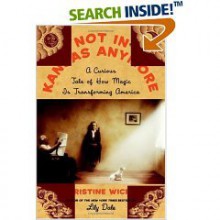
I was quite excited to spend my monthly Audible credit on this book; what a fascinating idea--reframing American history by examining our relationship with our landmark haunted locales.
I, unfortunately, have returned it to Audible.
Each house is well-chosen: the Lemp mansion, for example, as a haunted touchstone in American history and culture...
and then debunked as an actual, or at least a full as-known haunting by the author. Chapter after chapter.
I hung on through the underlayer of smugness until the author stated repeatedly that Spiritualism didn't last, it was dead, it was no longer a thriving practice in the United States. Then I stopped reading. Why? I had reached the intolerable level of poor scholarship and research. There is an entire town of Spiritualists who live and work as such, in plain sight, and have done so for years: Lily Dale. Both a documentary and a book are available about Lily Dale, New York, and both are easy to find:
Lily Dale: The Town That Talks to the Dead * Christine Wicker
HBO Documentaries: No One Dies in Lily Dale
Side note: The author was also treated well by the Lemp Mansion's hosts, taken on their Haunted Tour, and given the choice room--one that is on the tour because it is reported to exhibit so much phenomena. His entire account of his Lemp tour and stay was mocking, in my opinion, disdainful of staff, location's history, and even his fellow tour group members! I feel as if I have been subjected to a history book written by a hipster: "Look, we're supposed to be enjoying this. OMG, all these people are really enjoying this! I cannot wait 'til I return to my cocktail and typewriter." Combined with the shoddy research, and some debunking claims without citations, this book is disappointedly unprofessional.
Also posted at The Dollop: American History Podcast

 Log in with Facebook
Log in with Facebook 








